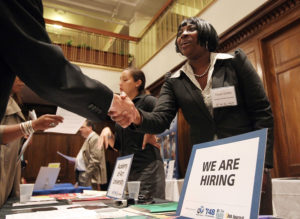
Financial experts from the Economic Policy Institute in Washington, D.C., point, in part, to the obvious — the labor market is improving. But it’s not only that. It’s also that African-American workers are more vulnerable to the ups and downs of the economy.
“African-American families suffer disproportionately from labor market downturns and reap disproportionate gains during recoveries,” Heidi Shierholz, senior economist and director of policy at The Economic Policy Institute, recently told Yahoo! Finance. “Empirically, the effect is stronger the further down the wage distribution you go. Labor-market conditions matter the most for low-wage workers, and to the extent that you have African American workers disproportionately concentrated at the lower end.”
Shierholz predicts that the job rate is moving in a positive direction for everyone, which means fewer jobless African-Americans. Of course, it’s worth noting that the jobless numbers only reflect those Americans actively looking for work. They do not reflect workers who’ve given up the job hunt and may also overlook individuals who’ve taken on unconventional ways of making money, such as independent contractors or freelance workers. In any case, economists argue that at the moment not only are Black workers benefiting from an upturn in the labor market but also from the fact that, unlike whites, they work in industries that aren’t in danger of shrinking in the 21st century.
Blacks overwhelmingly work in the health care industry and in blue-collar roles such as security guards or bus drivers, according to the Bureau of Labor Statistics. In fact, although Blacks comprise 12 percent of the workforce (about their share of the total U.S. population), they make up a quarter of workers in the aforementioned fields. So, what do health care workers, security guards and bus drivers have in common? Robots, or automation, can’t easily replace them. But the opposite is true for white male workers, according to Indeed’s chief economist Jed Kolko.
Kolko told Yahoo! that white men, older workers and less-educated workers are typically employed in fields such as forestry, architecture and engineering, all industries in which jobs are disappearing. They also tend to work as accountants, bookkeepers and mail carriers, positions subject to replacement by automation as well. Accordingly, Kolko suggests that whites are more anxious about the economy than Blacks and Latinos are. At the same time, he points out that Blacks and Latinos are financially in worse shape than whites, having been hit harder by the Great Recession, joblessness and low wages overall.
If people of color in the United States indisputably fare worse in any economic climate than whites do, how is it accurate, or fair, to say that whites are more economically anxious? Ever since Donald Trump won the 2016 presidential race, political pundits and the press have weighed in on the economic woes of the whites who voted for him, overlooking the very real and pressing concerns of the Americans who felt marginalized by his xenophobic and racist rhetoric. The fact is, whites from a wide range of income brackets backed Trump, but Hillary Clinton actually won the voting demographic who earned an income of $50,000 or less. To boot, many of the reports about whites and economic anxiety have proven to be false at worst and overblown at best. For example, Trump has mentioned coal miners, who are largely white, repeatedly during his campaign and first months in the White House.
In March, Trump announced that he was easing environmental regulations enacted by President Barack Obama because they would have adversely affected the coal mining industry and others. “My action today is the latest in a series of steps to create American jobs and to grow American wealth,” he said before a group of coal miners. “I made them this promise. We will put our miners back to work.”
But it turns out, as The Washington Post found, that the restaurant chain Arby’s actually employs more workers than the coal mining industry does altogether. The Post estimates that there are 76,572 coal miners, while Arby’s employs roughly 80,000 workers. While coal miners surely have economic anxiety, there are far fewer of them than people working in other industries, be it retail, travel agencies or even used car dealerships. Yet, Trump and, in turn, the media has spent an inordinate amount of time discussing the struggles of a small industry dominated by white men rather than the blue-collar fields in which diverse groups of Americans serve. And despite the focus on white economic anxiety in the immediate aftermath of Trump’s election win, research has subsequently found that whites aren’t so anxious about the labor market after all. Racism, not economic woes, motivated many voters to support Trump.
A study by The Atlantic and the Public Religion Research Institute found that Trump voters feared feeling alienated in America and supported deportations of immigrants and even a lack of investment in education as a result. Also, the Milwaukee Journal Sentinel conducted a survey of Wisconsin voters revealing that any economic anxiety voters felt last fall had all but vanished between October and March. That’s because these voters weren’t really economically anxious at all.
Economic anxiety means being one of the four in 10 Americans who can’t afford to pay a surprise $500 expense. It means paying all of one’s bills late or not opening the bill at all because it’s impossible to cover. It means food insecurity or using more than a third of one’s income to pay for housing. Economic anxiety is not working in a high-wage industry that’s undergoing changes because of advances in technology. The reason African-Americans disproportionately work in fields that are in no danger of disappearing is because they still face far too many barriers in education and the workforce to enter architecture, engineering or accounting in the first place.
As long as racial inequality and income inequality are inextricably linked in the United States, white workers will never have more economic anxiety than nonwhite people.


